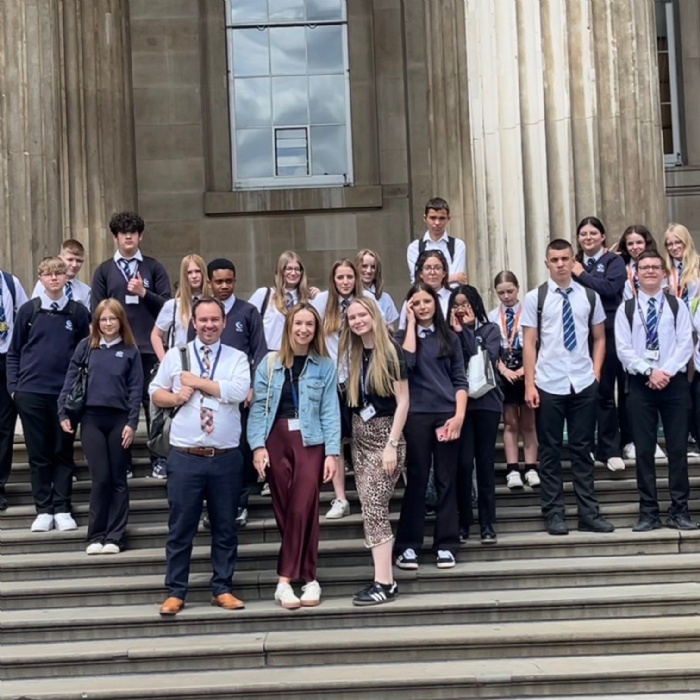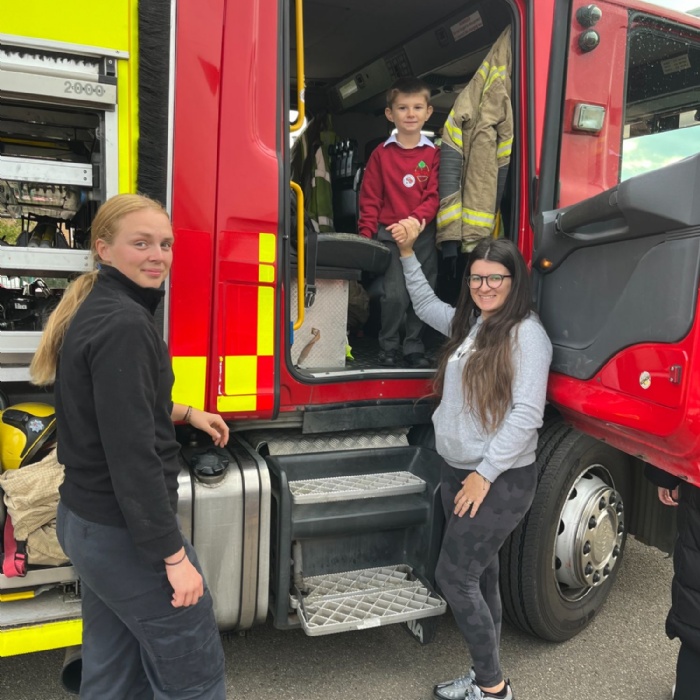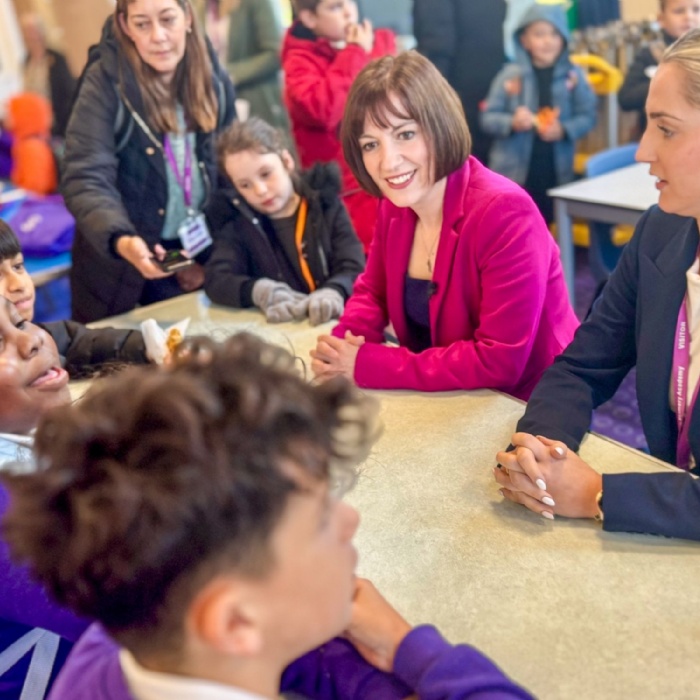The Wisbech Academy – a successful first year

“We have created a truly flourishing sense of community both within the school and beyond. Nurturing our staff and prioritising their wellbeing has created a ripple effect that extends to our students and the wider community.”
Dr Rachel Lawrence-Byron, Associate Principal, The Wisbech Academy
As the first year of The Wisbech Academy draws to a close, Principal Dr Rachel Lawrence-Byron shares her first-year reflections on a successful journey so far. Having joined Brooke Weston Trust three years ago as the Director of Professional Development (a Trust-wide role), Dr Lawrence-Byron now leads The Wisbech Academy, supporting the school's mission to provide students with an education that gives them the choices and opportunities to shape their futures, and make a positive difference in the world. In September 2024, The Wisbech Academy opened its doors to 95 eager Year 7 students from a dedicated area within the Thomas Clarkson Academy building - an initial short-term arrangement to launch the school. This September (2025), the Academy will move to a new larger modular building, welcoming a Year 7 cohort of 120 students with improved facilities and dedicated spaces. As the school grows year on year and moves to its permanent site (on track to open in 2027), The Wisbech Academy will eventually cater 600 students from Year 7 to Year 11, offering local families a choice of secondary education alongside the 1,400-student Thomas Clarkson Academy. The two schools will combine at Sixth Form stage to become ‘The Wisbech Campus Sixth Form’.
Rachel, as the first year draws to a close, what achievements stand out for you?
Successfully beginning to embed our three guiding principles: Flourishing Community, Great Teaching and Learning Beyond the Classroom, forms the foundations of our key achievements this year.
We have created a truly flourishing sense of community both within the school and beyond. Nurturing our staff and prioritising their wellbeing has created a ripple effect that extends to our students and the wider community. We have fostered a positive, restorative approach to relationship-building with students.
Great Teaching is a collaborative achievement with Brooke Weston Trust. Together we have built robust evidence-informed systems, drawing on the expertise of organisations such as Evidence Based Education. Their Great Teaching Toolkit has supported the delivery of high-quality teaching across our school. We have also made use of Steplab, a professional development tool that improves teacher expertise helping us to further develop our teaching expertise.
Our third core value, Learning Beyond the Classroom, has defined many of our achievements by nurturing students’ intellectual curiosity. Our students have taken part in a range of enriching trips, from attending a pantomime in King’s Lynn to visiting the National Space Centre in Leicester through the John Egging Trust. We have worked with the Brilliant Club, to run two of their programmes, The Scholars Programme and the Sanctuary Scholars Programme. Both programmes encourage students to learn about opportunities at highly selective universities, and this year students involved in the programmes visited Girton College, Cambridge.
Within the school, we have created a culture where enrichment is encouraged for all students. There is a varied offer available for after school clubs including choir, maths escape rooms, robotics club, journalism club and Minecraft, as well as varied opportunities to take part in Sports.
We are extremely proud of Luka, who participated and won a design competition for the Princes Group, a major food manufacturer based in Wisbech, to celebrate their 100 year anniversary of canning. Luka designed a unique label to mark their landmark celebration, and her design will be printed on labels and used across a number of their products.
How have relationships with students, staff and the local community been built?
When our Year 7 cohort first joined, we supported their transition from primary to secondary school with a dedicated welcome week. We encouraged them to reflect on their feelings and engaged them in transition activities, such as sharing their favourite things, such as books. We introduced a behaviour curriculum that clearly outlined our expectations. Teachers explicitly taught these expectations, and we refined the curriculum over time through ongoing reflection and review of outcomes.
In November, we had ‘Positive Noticing Day’ an idea from Paul Dix where students are recognised and rewarded with personalised tags that they can display on their bags or ties, highlighting and celebrating positive behaviours. This has helped to create a warm and supportive culture in the school.
Character education has been a key part of our relationship-building strategy. Using our eight virtues specific to The Wisbech Academy, we reinforce these values through tutor time and assemblies.
Among staff, strong relationships are supported through a staff association, run by teachers, which organises social events, birthday gifts, and wellbeing initiatives. A staff forum provides termly feedback via an engagement platform, creating a continuous loop for staff voice and improvement. Professional development is a priority, with CPD available through the Evidence Based Education programmes and the OLEVI Coaching Programme, which helps nurture excellent teachers and leaders.
We have also begun building meaningful connections with the local community, with exciting plans ahead. This year, our 25-member choir visited a local care home, bringing joy to residents, and we took part in a community carol celebration in school, which had a fantastic turnout. I have joined the Wisbech Schools Partnership, where local school leaders collaborate to share ideas and deepen community integration.
How has working alongside Thomas Clarkson Academy benefited the Wisbech Academy?
Many teachers at Thomas Clarkson Academy (TCA) have been generous with their time and expertise. One standout example is music, where we partnered with TCA for the Britten Sinfonia project. This allowed our students to engage in individual music projects and participate in live performances.
Support for English as an Additional Language (EAL) has also been invaluable. TCA’s expertise in this area has helped ensure that students whose first language is not English are fully supported and not limited by language barriers.
With a strong focus on STEM, how is this built into the curriculum?
We are very fortunate to have the Director of STEM based on-site, and with their expertise, we have been developing a bespoke, STEM-based science curriculum tailored to our students.
Our students have benefited from collaborative experiences, such as Science Week in partnership with TCA, where they were able to observe live demonstrations and explore scientific concepts in action. Through the Wisbech Primary School Partnership, we have extended our outreach by offering science-based activities to primary pupils, giving them a taste of what science looks like at secondary level.
With the support of the John Egging Trust, which has a strong STEM focus, we have run exciting workshops and trips that help ignite students’ enthusiasm for science and engineering. Within the school, we offer a variety of popular STEM clubs, including a Maths Escape Room, Robotics Club, and Minecraft Club, which students can opt into based on their interests.
This term, we are participating in STEMFest, a creative initiative where students designed solutions to real-world problems. They presented their projects in a judged competition, supported by both internal and external mentors who help guide their ideas.
How has the school community reacted to the changes and developments over the past year?
Our students and families have responded very positively, showing real resilience in the face of change, particularly with the challenge of operating without our own dedicated building. Despite these obstacles, they have embraced the journey with optimism and adaptability. Communication with parents has been strong, and we have established a Parent, Teacher and Friends Association, which has become an active part of school life, providing refreshments at events and fundraising to support our community.
What are your main hopes and priorities for the academy next year?
Looking ahead to next year, we are excited to implement the ‘Visions and Voices’ curriculum, an interactive, engaging approach, where students will have one teacher for eleven lessons per week. This will allow them to build strong relationships with that teacher. Students will experience a more gradual transition into secondary school, being taught by up to six teachers rather than a dozen. This more streamlined structure is designed to support their adjustment and provide a nurturing learning environment.
We have already laid strong foundations this year, and our priority now is to continue developing and refining our curriculum. Personally, I am really looking forward to building a clear and strong sense of identity for the school. Once we move into our own building, that identity will become even more visible, and the local community will be able to clearly see what The Wisbech Academy stands for.





.jpg)

